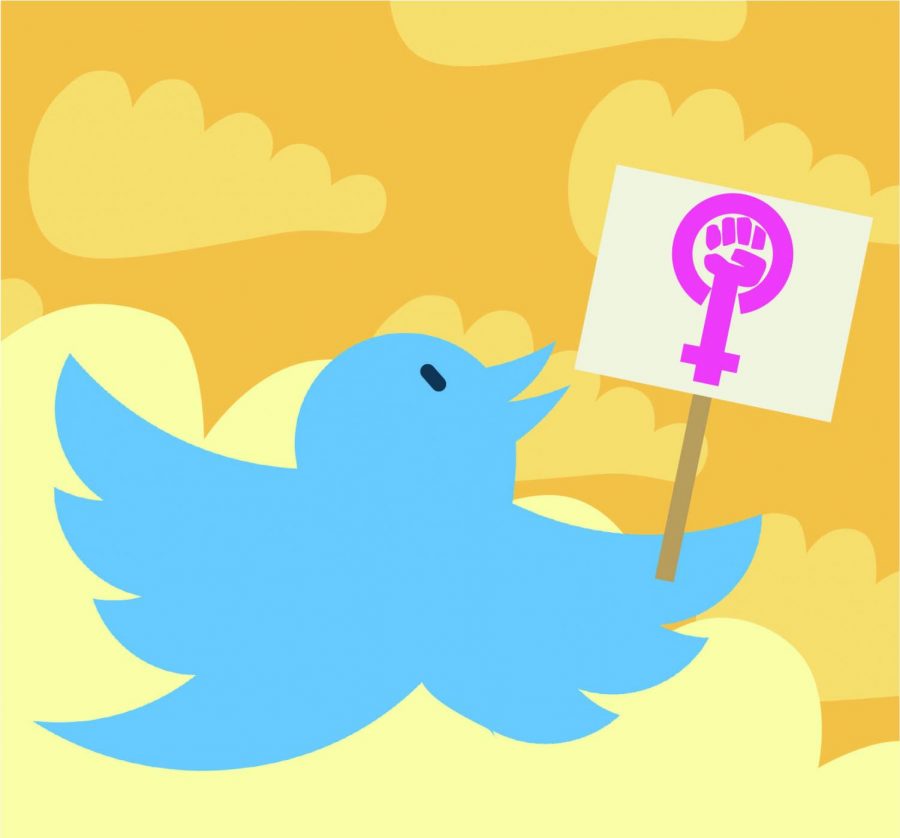Well-being soars when women tweet about sexism
February 9, 2015
A recent examination of women’s tweets about sexism has been linked to an improvement in female well-being, according to a Jan. 30 study published in the British Journal of Social Psychology.
The study took place over the course of three days. Different instances of sexism were presented to 93 female college students. On the first day, articles about sexism in the media were distributed. On day two, the study’s participants read articles regarding sexism in politics, and examples of sexism on the university’s campus were presented on the third day. The study’s participants were placed into four groups—one tweeted publicly about the sexism, one tweeted privately about sexism, one tweeted publicly about the weather, and one group was instructed not to tweet.
“What I saw across the three days was that well-being increased, but only for the people who were asked to tweet [publicly],” said Dr. Mindi Foster, lead author and an associate professor of psychology at Wilfrid Laurier University. “One of the reasons I think it leads to well-being is based on the linguistic analysis I did of the words that they used in their tweets … When people try to make meaning of a negative event in their lives, it enhances their well-being.”
Participant well-being was measured before and after tweeting through mood questionnaires and well-being polls.
“One of the components of well-being is your mood, so positive and negative mood was measured,” Foster said. “Another component is psychological growth, so tapping into things such as being able to master your own environment, feeling autonomous, feeling that you can grow from experiences, those sorts of things.”
The study also explored how tweeting could serve as a medium for feminist collective action, or the actions taken together by individuals to achieve a common goal.
“We didn’t tell them explicitly to use collective action, yet when we coded all the tweets, it was clear that over 90 percent of them had used a form of collective action called consensus mobilization,” Foster said. “Essentially, they showed elements of trying to indicate that the state of affairs, namely sexism, was not appropriate and should be changed, so they were trying to get the word out that this was wrong.”
Tweets were analyzed for emotions, such as sadness and happiness, as well as overall well-being and linguistic markers. More than 90 percent of the tweets identified a problem, while 87 percent of the tweets criticized the examples of sexism presented. The women presented new information in more than half of the tweets to combat the sexism found in the news articles. Some examples of the tweets include, “I care about ideas not what you’re wearing.”
As the founder and president of Columbia-based O FACE (Feminists Actively and Comically Empower), freshman business & entrepreneurship major Grace Kinter utilizes Twitter and Facebook to share articles on feminism.
“Everyone who follows me sees it,” Kinter said. “They can either go past it and not think anything of it, or they can see it and it can make them think a little bit. Even if someone looks by and thinks about it a little bit and says, ‘Oh, you know what, that’s true.’ That’s making a small difference.”
O FACE primarily focuses on empowering female students and discussing the positives of being a woman, according to Kinter. Through both her personal accounts and the O FACE Facebook page, Kinter strives to spread anti-sexism messages while encouraging confidence.
“I just try to convey really positive messages,” Kinter said. “I think social media is taking over the world in a way. I have my fair amount of sharing what I just ate, but I also think, ‘Why not say it to share a positive message?’”
Kinter said seeing sexist material on the Internet also fuels her passion for feminism and activism.
“It makes me mad, but it makes me want to work harder to be one of the people who helps change the gender gap,” Kinter said. “It’s so necessary for there to be a change. There’s so many things that change constantly, so I don’t see why we can’t knock this whole gender gap.”
As the co-president of The F Word, a feminist campus organization, junior cinema art + science major Charlotte Adams also utilizes Facebook to share articles and information about feminism.
“[Social media] plays a really important role in society changing,” Adams said. “I feel like even now, people have a misunderstanding of what feminism is, and I feel like combating that is what [The F Word] does on social media.”
Adams said posting pro-feminist messages and content to both The F Word and her personal account makes her feel that she is making a difference.
“I definitely feel like it’s empowering to share stories that [they] might not normally share,” Adams said. “I know in my personal experience, being more open about being a feminist [made my] self-confidence greatly improve.”








